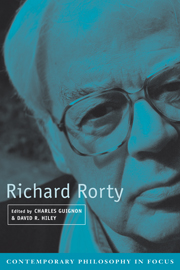Book contents
- Frontmatter
- Contents
- Contributors
- Acknowledgments
- Abbreviations
- Richard Rorty
- 1 Introduction: Richard Rorty and Contemporary Philosophy
- 2 Rorty's Critique of Epistemology
- 3 Rorty on Knowledge and Truth
- 4 From Realism or Antirealism to Science as Solidarity
- 5 Rorty's Democratic Hermeneutics
- 6 Rorty's Inspirational Liberalism
- 7 Don't Be Cruel: Reflections on Rortyan Liberalism
- 8 Rorty and Philosophy
- Bibliography
- Index
5 - Rorty's Democratic Hermeneutics
Published online by Cambridge University Press: 18 December 2009
- Frontmatter
- Contents
- Contributors
- Acknowledgments
- Abbreviations
- Richard Rorty
- 1 Introduction: Richard Rorty and Contemporary Philosophy
- 2 Rorty's Critique of Epistemology
- 3 Rorty on Knowledge and Truth
- 4 From Realism or Antirealism to Science as Solidarity
- 5 Rorty's Democratic Hermeneutics
- 6 Rorty's Inspirational Liberalism
- 7 Don't Be Cruel: Reflections on Rortyan Liberalism
- 8 Rorty and Philosophy
- Bibliography
- Index
Summary
In Philosophy and the Mirror of Nature, Hans-Georg Gadamer's hermeneutics serves Rorty as an antidote to epistemology. As Rorty characterizes epistemology, it is supposed to provide an overarching framework for all contributions to knowledge that can count as genuine. Epistemology functions as a cultural overseer; its task is to adjudicate the grounds, or identify the lack of grounds, for all claims to knowledge. Hermeneutics, in contrast, functions more as a mediator, and its task is to promote the sorts of conversations in which disagreements between claims might be overcome. Of course, epistemology is also interested in overcoming disagreements. Yet, it understands the hope of doing so as a “token of the existence of common ground which, perhaps unbeknown to the speakers, unites them in a common rationality” (PMN 318). Hermeneutics, as Rorty understands it, conceives of the same hope as functioning without preexisting grounds. The hope of agreement is rather the hope that we can come to understand one another, that we can pick up each other's language and use it to reconsider or even revise our understanding of the world and ourselves.
In Rorty's analysis, hermeneutics replaces the goal of grounding cognition with that of Bildung, or edification. Epistemologically oriented philosophy supposes that it can and must discover the foundations upon which true sentences are possible. The concept of Bildung, in contrast, signifies an interest in exploring different possible sentences, particularly those that might become true of us.
- Type
- Chapter
- Information
- Richard Rorty , pp. 105 - 123Publisher: Cambridge University PressPrint publication year: 2003
- 3
- Cited by

